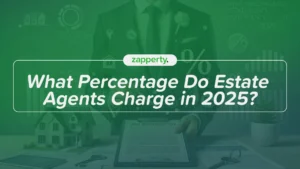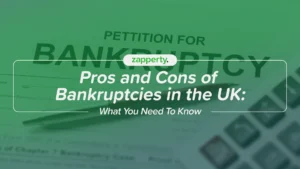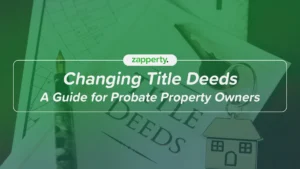Looking to sell your home? It can be a stressful time with a lot going on! It’s easy to get caught up in the excitement of it all and not do your research. One thing you’ll want to be clued up on is estate agent charges.
When buying or selling a home, estate agents’ fees or charges can add up. If you need to sell up quickly or are using an agent for your purchase and you’re close to your budget, estate agent fees can really throw a spanner in the works. This blog post explains what percent do estate agents charge in 2025, how they arrive at their figures and how you can try to reduce the amount you pay.
What percentage do estate agents charge in 2025?
Estate agents in the UK charge anywhere between 1% and 4%. Unfortunately, many factors contribute to this, so it’s impossible to give an exact figure. Estate agent fees in the UK have typically always been within this range, but due to data protection and inconsistent record keeping, it’s hard to put where they are in 2025 in a historical context.
Why Do Estate Agent Commission Rates Vary?
Estate agent fees can vary for several reasons. For example, the property market is in a constant state of flux, with changing house prices, increasing mortgage rates and a cost of living crisis all having an impact. As the costs of doing business rise, so too do estate agent fees. Tied in with this, location is also a factor, with larger cities and desirable locations generally seeing higher estate agent charges.
Additionally, many estate agents offer varying service levels and target different market sectors. High-street estate agents appeal to the widest market and are who most buyers and sellers will be familiar with. However, some estate agents cater to the top end of the market, while others specialise in property as investment or commercial property.
Lastly, the experience of the estate agent themselves will impact what percentage they charge. Experienced estate agents who have built a network of contacts and relationships over their career will often charge more, on the basis that they can often secure the best deals for their clients.
Who pays the estate agent fees?
The seller usually pays the estate agent charges upon completion of the sale, unless an alternative arrangement is in place.
Breaking Down Estate Agent Commission Numbers
Estate agent charges cover a wide range of costs and services beyond the actual sale of the property. Your exact service levels will vary, but they usually cover:
- Property valuation
- Property listings, photos, floor plans and descriptions
- Advertising and marketing your property
- Communication with buyers and managing viewings
- Sales negotiations
If you’re on the other side and using a buying agent, their fees will typically cover:
- Understanding your needs
- Researching properties, contacting selling agents and organising viewings
- Offering guidance and advice during viewings
- Purchase negotiations
- Offering other professional support and recommendations
Buying agents typically charge between 1% – 3%. Some may also require an upfront charge, which is taken off the total at the end of the deal.
Types of UK Estate Agent Fees
Estate agent fees in the UK generally fall into two camps, percentage-based and fixed fee. Percentage-based estate agent fees are by far the most common and often come with a sliding scale. The higher the sale price, the larger the commission for the agent. These also often include “No Sale, No Fee” agreements.
Fixed fees involve paying an agreed amount to the agent upfront. These offer simplicity and certainty in terms of your costs, but you will still have to pay them if the property doesn’t sell.
Some online agents offer reduced fees, but usually for a lower level of service. However, if you’re looking to sell quickly, Zapperty will buy your home in cash, and provide a free offer within seven days.
Do estate agents charge for valuations?
Estate agents don’t usually charge outright for valuations if you choose to sell your property with them, as this cost is covered by the estate agent fees. However, some may charge you for one-off valuations.
The costs of selling your home yourself vs an agent
Some people choose to sell a property themselves, forgoing an agent to save on the fees. While this can certainly reduce some costs, you will still have to pay to list the property in various online and offline locations.
There will also be a cost on your time as you will have to write the property descriptions and take/edit photos, communicate with every enquiry, arrange and manage viewings, and conduct negotiations yourself. If you have a family and a full-time job, this can put a large strain on your time, especially if you’re also looking for a new property to buy.
Avoiding Estate Agent Fees
Estate agent fees can be a significant expense when selling your property, often taking a sizable chunk out of your final sale price. However, with careful planning and the right strategies, you can avoid these fees entirely. Here’s how:
1. Sell Directly to Cash Buyers
One of the easiest ways to avoid estate agent fees is by selling directly to cash buyers. Companies like Zapperty offer a hassle-free, straightforward solution for homeowners who want to sell quickly without the stress of dealing with traditional estate agents. By bypassing estate agents altogether, you can save on fees while ensuring a swift and secure sale. Zapperty provides a no-obligation cash offer within seven days, helping you move forward with confidence.
This option is particularly useful for homeowners looking for a swift and hassle-free sale due to financial difficulties, probate, or personal circumstances.
2. Find Buyers Independently
If you prefer a more hands-on approach, consider finding buyers independently. You can market your property using online platforms, social media, and local advertising. Hosting open houses is another effective way to attract potential buyers without involving estate agents.
However, this approach requires time and effort. You’ll need to handle property viewings, negotiate offers, and manage contracts. For those who have the time and knowledge, it can be a cost-effective alternative to traditional estate agents.
3. Understand Estate Agent Contracts
If you do decide to work with an estate agent, thoroughly review their contract terms to avoid unexpected fees. Key points to watch for include:
- Withdrawal Fees: Charges that apply if you decide to terminate the contract early.
- Tie-in Periods: The minimum duration you must stay with the agent before switching or ending the agreement.
- No Sale, No Fee Packages: These can help you avoid upfront costs but ensure there are no hidden terms that could impact your budget.
Understanding these details can prevent unpleasant surprises later and give you greater control over the selling process.
4. Consider Online Estate Agents
Online estate agents often charge lower fees than traditional high street agents. They usually operate on a fixed-fee basis, which can significantly reduce costs. However, their services might not be as comprehensive as those offered by traditional estate agents. If you’re comfortable handling some aspects of the sale yourself, such as viewings or negotiations, this could be a great way to save money.
Choosing the Right Estate Agent
Choosing the right estate agent is about more than just their fees. To ensure a smooth and successful sale, it’s essential to evaluate their performance, ask the right questions, and compare agents based on several factors.
1. Evaluate Performance and Success Rates
Not all estate agents are created equal. Look for agents with a proven track record of successful sales in your area. High success rates and glowing client reviews are good indicators of their ability to market your property effectively and achieve the best possible price.
2. Questions to Ask Estate Agents
When interviewing estate agents, ask the following questions to gauge their expertise:
- What is your success rate in selling properties like mine?
- What marketing strategies do you use?
- Do you provide professional photos or virtual tours?
- What is your fee structure, and are there any additional costs?
- What is the tie-in period in your contract?
These questions can help you assess whether the agent aligns with your needs and expectations.
3. Compare Beyond Fees
While cost is an important factor, don’t make it the sole focus. Consider their marketing plans, local knowledge, and communication skills. For example, a higher fee might be justified if the agent provides exceptional marketing, hosted viewings, or a seamless sales process.
Online vs. High Street Agents
The debate between online and high street agents has grown in recent years, with each offering distinct advantages and drawbacks.
Comparison of Fees
- Online Estate Agents: Often operate on a fixed-fee model, charging lower rates but requiring more involvement from sellers.
- High Street Estate Agents: Typically charge a percentage of the sale price, offering a more hands-on service that includes local knowledge and in-depth support.
Impact on Traditional Fee Structures
The rise of online agents has challenged traditional estate agents, leading some to adjust their pricing structures or enhance their services to stay competitive. High street agents now often include extras like hosted viewings, comprehensive marketing plans, and a more personalised experience to justify their fees.
Choosing the Right Model for You
Your choice between online and high street agents depends on your priorities. If you value local expertise and full-service support, a high street agent might be the best fit. Conversely, if you’re confident handling parts of the sale yourself, an online agent could save you money.
Negotiating Lower Estate Agent Charges
It is certainly possible to negotiate on what estate agents charge for selling a house. Many will not list their prices, instead creating a bespoke offer depending on the individual aspects of the sale.
For example, a property they suspect may be harder to sell or requires a more hands-on approach, may make them charge more. On the other hand, a desirable property that’s in good condition and a nice area should require less work on their part, which may be reflected in their offer.
How to negotiate estate agent fees
Every agent is different but some popular negotiating strategies include:
- Getting multiple valuations and quotes from several agents to identify the best rates. You can also use this as leverage in your negotiations with others.
- Asking for a sole agency agreement often leads to lower fees. However, as the agent is the only one authorised to list and sell your property, you are limiting your potential reach.
- Offer a sliding scale approach with higher percentage incentives for larger sale prices.
- Know when to quit. Knowing when to walk away from a bad deal is good. However, it’s also not a good idea to sour a potential professional relationship from the outset. An estate agent is in charge of selling your most valuable possession, so keeping them on side is always smart.
Estate agents offer a vital service but it comes at a cost. For some, this is worthwhile as it helps ensure a smooth sale. However, if you’re looking for something different, contact Zapperty. We’ll buy any home and provide you with a free cash offer within seven days. There are no estate agent fees, no hidden costs, just a quick, simple sale.




